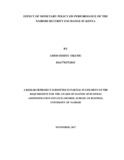| dc.contributor.author | Okumu, Amos S. | |
| dc.date.accessioned | 2018-01-31T13:18:11Z | |
| dc.date.available | 2018-01-31T13:18:11Z | |
| dc.date.issued | 2017 | |
| dc.identifier.uri | http://hdl.handle.net/11295/103037 | |
| dc.description | A Research Project Submitted in Partial Fulfilment of The Requirement for the Award of Master of Business Administration (Finance) Degree, School of Business, University of Nairobi | en_US |
| dc.description.abstract | Stock markets are mainly used as market for raising the capital required to run businesses. The stock market give an indication of the overall status of a market as reflected in the stocks traded on it. Monetary policy is well utilized can support aggregate demand, boost economic development of a nation and drive stock prices higher. Monetary policies influence the level of money circulation and other key economic activities. The current study sought to investigate how monetary policy affected performance of the Nairobi Security Exchange in Kenya. Performance of NSE was measured using NSE 20 share index. The indicators of monetary policy which formed independent variables of the study included Money Supply (Money supply as a % of GDP); Inflation (Consumer Price Index); Repurchase rate (REPO Rate) and 91 Days
Treasury Bill Rate. The study looked at how these indicators affected performance of NSE. The researcher collected secondary data mainly from the Kenya National Bureau of Statistics KNBS, NSE reports and publications and past journals and researcher. The study used secondary data collected from 2006-2016. The collected data was analyzed using SPSS software by descriptive and inferential statistics. The study established that interest rate had a direct significant relationship with performance of NSE (r=0.337, p=0.025<0.05); money supply (r=-0.194, P=0.204>0.05) and Treasury bills rate (r=0.283, p=0.063>0.05) were inversely correlated with performance of NSE. The study concluded
that there was a direct correlation between interest rate and performance of NSE, there was an inverse correlation between money supply, treasury bills rate with performance of NSE, inflation either positively or negatively affects performance of NSE based on the prevailing economic conditions. The study recommended that the top management team of all companies operating Kenya and especially those whose shares are listed on NSE should leverage on monetary policies to enhance their performance which shall affect NSE performance. The Capital Market Authority CMA should timely communicate changes in monetary policy to investors and shareholders at NSE and how their wealth
shall be affected. The Central Bank of Kenya together with the National treasury should work hand in hand to ensuring sound monetary policies on macroeconomic indicators (inflation, interest rates, and money supply) and fiscal policies (government expenditure
and taxation). | en_US |
| dc.language.iso | en | en_US |
| dc.publisher | University of Nairobi | en_US |
| dc.rights | Attribution-NonCommercial-NoDerivs 3.0 United States | * |
| dc.rights.uri | http://creativecommons.org/licenses/by-nc-nd/3.0/us/ | * |
| dc.title | Effect of Monetary Policy on Performance of The Nairobi Security Exchange in Kenya | en_US |
| dc.type | Thesis | en_US |



